|
|
|
Sort Order |
|
|
|
Items / Page
|
|
|
|
|
|
|
| Srl | Item |
| 1 |
ID:
172229
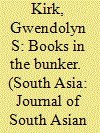

|
|
|
|
|
| Summary/Abstract |
Under United States Public Law 480, a major hallmark of Cold War diplomacy, India received millions of dollars in loans from the US during the 1950s and 1960s in the form of food and agricultural products. A portion of the interest due on this loan was repaid by India partly in the form of books in about two dozen languages which were collected from across South Asia and sent to the Library of Congress and several universities in the country during the heyday of the development of Area Studies. The object of this paper is a large deposit of written material—books, periodicals and ephemera—that was sent to the University of Texas at Austin over a period starting in the 1960s under the PL 480 programme. Most of these materials were added to the library collections, but a large number of them remained uncatalogued for about fifty years in an underground library storage facility in downtown Austin. The history of these materials, and the moment when they reappeared provides a case study of how books are appropriated (or not) into academic, library and political assemblages, and the way disciplines and their canons have been shaped by politics and infrastructure from the Cold War into the neo-liberal age.
|
|
|
|
|
|
|
|
|
|
|
|
|
|
|
|
| 2 |
ID:
102676
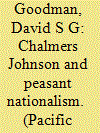

|
|
|
| 3 |
ID:
142073


|
|
|
|
|
| Summary/Abstract |
A recent Pacific Affairs special issue explores key dimensions of the discipline/area studies divide in the context of Southeast Asia. It asks whether it is possible to use the comparative methods favoured by disciplines while doing justice to the rich nuance of individual cases. We offer a practical perspective on this debate. We argue that the demands of discipline audiences and area-studies audiences can vary significantly, making it difficult to effectively address both within a given project. Furthermore, while individual scholars retain agency over the nature of their research, structural factors like the job market and tenure requirements nudge junior scholars towards disciplinary audiences. We support this claim with an analysis of several academic job markets across the social sciences and humanities. We also interview several junior scholars who focus on Southeast Asia to examine the channels that link structural factors with scholarly orientations, finding both direct and backchannel connections. We conclude that in the absence of structural changes to the hiring and promotion practices at major universities, the question of an ideal balance between comparative approaches and deep area nuance will be answered by practical—rather than ontological or normative—concerns.
|
|
|
|
|
|
|
|
|
|
|
|
|
|
|
|
| 4 |
ID:
133784
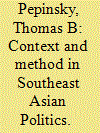

|
|
|
|
|
| Publication |
2014.
|
| Summary/Abstract |
This essay introduces and evaluates a central debate about context sensitivity in Southeast Asian political studies. Within this diverse field, there is no agreement about what context means, or how to be sensitive to it. I develop the idea of unit context (traditionally, the area studies concern) and population context (traditionally, the comparative politics concern) as parallel organizing principles in Southeast Asian political studies. The unit context/population context distinction does not track the now-familiar debates of qualitative versus quantitative analysis, nor debates about positivist epistemology and its interpretivist alternatives, nor even political science versus area studies. Context is not method, nor epistemology, nor discipline. Rather, the core distinction between unit-focused and population-focused research lies in assumptions about the possibility of comparison, or what methodologists call unit homogeneity. While I conclude on an optimistic note that a diverse Southeast Asian political studies (embracing many disciplines and many methodologies) is possible, the fact remains that unit context and population context are fundamentally incommensurate as frameworks for approaching Southeast Asian politics, and that population context is the superior approach.
|
|
|
|
|
|
|
|
|
|
|
|
|
|
|
|
| 5 |
ID:
169799
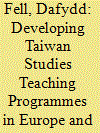

|
|
|
|
|
| Summary/Abstract |
Over the last two decades, there has been a rapid expansion in the number of Taiwan programmes at universities in America and Europe; however, few of these Taiwan programmes have attempted to develop teaching courses. Where Taiwan courses have been introduced, they have tended to be in isolation and not well integrated into existing academic programmes. Among the universities with Taiwan programmes, only two have attempted to create comprehensive teaching programmes through which students can graduate with a degree in Taiwan studies: SOAS University of London and the University of Texas at Austin. The purpose of this paper is to compare the experiences of these two institutions in developing such niche teaching programmes. It begins with a discussion of how these two programmes first emerged and then goes on to review their distinct development trajectories and key features. The paper offers an analysis of how these two programmes were able not only to survive but also to expand their offerings and thrive in an academic environment that should be hostile to such niche programmes. It concludes with a review of the remaining challenges facing these teaching programmes.
|
|
|
|
|
|
|
|
|
|
|
|
|
|
|
|
| 6 |
ID:
105925
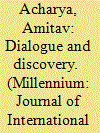

|
|
|
|
|
| Publication |
2011.
|
| Summary/Abstract |
Scholars of International Relations (IR) increasingly realise that their discipline, including its theories and methods, often neglects voices and experiences outside of the West. But how do we address this problem and move the discipline forward? While some question whether 'Western' and 'non-Western' (or 'post-Western') are useful labels, there are also other perspectives, including those who believe in the adequacy of existing theories and approaches, those who argue for particular national 'schools' of IR, and those who dismiss recent efforts to broaden IR theory as 'mimicry' in terms of their epistemological underpinnings. After reviewing these debates, this article identifies some avenues for further research with a view to bringing out the global heritage of IR. These include, among other things, paying greater attention to the genealogy of international systems, the diversity of regionalisms and regional worlds, the integration of area studies with IR, people-centric approaches to IR, security and development, and the agency role of non-Western ideas and actors in building global order. I also argue for broadening the epistemology of IR theory with the help of non-Western philosophies such as Buddhism. While the study of IR remains dominated by Western perspectives and contributions, it is possible to build different and alternative theories which originate from non-Western contexts and experiences.
|
|
|
|
|
|
|
|
|
|
|
|
|
|
|
|
| 7 |
ID:
141204
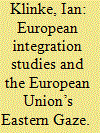

|
|
|
|
|
| Summary/Abstract |
European integration studies has recently seen the first signs of a belated critical turn. While new approaches have started to challenge the way the European Union is conventionally studied, they are yet to investigate in detail the relationship between the academic field and its primary object of study. This article draws on work in critical geopolitics to explore one of the interfaces of academic knowledge on European integration and the world of policy: the Jean Monnet Programme. In highlighting the scheme’s role in the EU’s Eastern geopolitics, it argues that European integration studies resembles other forms of area studies, such as cold war era Sovietology. This comparison elucidates both the field’s long-standing resilience to critical theory and its inability to anticipate the recent crisis of the European project.
|
|
|
|
|
|
|
|
|
|
|
|
|
|
|
|
| 8 |
ID:
095252
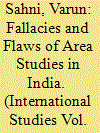

|
|
|
|
|
| Publication |
2009.
|
| Summary/Abstract |
Area studies programmes were established in Indian universities in two waves. The first wave emanated from an individual initiative of Prime Minister Jawaharlal Nehru in 1955 and the second from a committee set up by the University Grants Commission (UGC) in April 1963, soon after India's military defeat at the hands of China in 1962. While a large number of area studies programmes now exist in Indian universities, they have, from their earliest days, been handicapped by four conceptual fallacies and nine operational flaws. The fallacies are related to the subject matter, disciplinary focus, terms of reference and policy relevance, and the flaws are-the absence of theory, lack of multidisciplinary perspectives, analyses that are based on macro-level research, scarce fieldwork, deficiencies in language skills, lack of quantitative research projects, event-driven research agendas, predominance of secondary sources in research, and taught courses which are too broad in their formulation and too narrow in their subject matter. Each fallacy is fundamental; the flaws, taken together, have been fatal for the area studies programmes in India. The article ends with seven suggestions on how these programmes could be revitalized.
|
|
|
|
|
|
|
|
|
|
|
|
|
|
|
|
| 9 |
ID:
170629
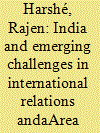

|
|
|
|
|
| Summary/Abstract |
This article captures a bird’s eye view of International Relations and Area Studies by offering a range of ideas and arguments from diverse phases including the current phase of globalisation. After exploring the nature of links between the two fields, it reflects on globalisation, looks at the prominent theories in international relations critically before moving on to discuss areas such as Latin America and Sub-Saharan Africa. Further, by shedding light on inter-area relations, it grapples to find a way to define an area. By treating India as an area in its own right, it relates India to different regions of Asia. It essentially argues that scholars in India need to evolve innovative concepts and theories by doing inter-disciplinary research that are useful for knowledge building exercises as well as policy think tanks.
|
|
|
|
|
|
|
|
|
|
|
|
|
|
|
|
| 10 |
ID:
109980


|
|
|
|
|
| Publication |
2011.
|
| Summary/Abstract |
In the 1970s in Mexico, anthropological regional projects were designed to explore new research interests: irrigation works, peasants, rural capitalism, and mines. Julian H. Steward, Eric R. Wolf, and Sidney W. Mintz, participants in the research project on Puerto Rico, were all popular authors among the new generation of anthropologists and were frequently cited in their thesis bibliographies. This article explores the influence of the People of Puerto Rico project at the design level of these new collective and regional projects. Students were distributed within larger areas, covering various climatic and production subareas, in their research training. The important role of cities, industries, haciendas, markets, and government programs was highlighted. I suggest that senior anthropologists and academic leaders who were planning this new anthropological era were more familiar than their students with the conceptual lines of the Puerto Rico Project. I gained greater insight into the difficulties of a regional research enterprise when I did anthropological research in the 1980s at the Tennessee Valley project.
|
|
|
|
|
|
|
|
|
|
|
|
|
|
|
|
| 11 |
ID:
133787
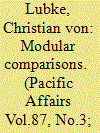

|
|
|
|
|
| Publication |
2014.
|
| Summary/Abstract |
This paper argues that analytical tensions between comparability and distinctiveness, which often drive a wedge between disciplinary and area-studies debates, are not irreconcilable. Drawing on original research of public governance in Southeast Asia, I contend that modular comparisons-which blend different levels of analytical scope and abstraction-offer a valuable methodological instrument for cross-fertilizing empirical depth and breadth. To showcase modular comparisons in practice, I present four interconnected studies of public governance in Southeast Asia. The analysis combines in-depth city-level analyses and subnational cross-sections (that draw heavily on Indonesia's multilevel governance experience) with an intraregional governance comparison (that expands the focus towards the Philippines and Thailand). To shed further light on "what makes governments work," the discussion traverses micro/macro-level confines and within-case/cross-case boundaries. In doing so, the concept of modular comparisons provides a systematic and contextually grounded perspective on Southeast Asian governance and a means for narrowing prevailing area-discipline divides.
|
|
|
|
|
|
|
|
|
|
|
|
|
|
|
|
| 12 |
ID:
068098


|
|
|
|
|
| Publication |
Berkeley, University of California Press, 2004.
|
| Description |
ix, 425p.Pbk
|
| Standard Number |
0520245369
|
|
|
|
|
|
|
|
|
|
|
|
Copies: C:1/I:0,R:0,Q:0
Circulation
| Accession# | Call# | Current Location | Status | Policy | Location |
| 050926 | 909/SZA 050926 | Main | On Shelf | General | |
|
|
|
|
| 13 |
ID:
133786
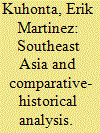

|
|
|
|
|
| Publication |
2014.
|
| Summary/Abstract |
This article seeks to assess the contributions and key characteristics of comparative-historical analysis in the field of Southeast Asian studies. It does so by examining three specific issues that emerge from this methodological genre: the conceptualization of the region of Southeast Asia, the role of theory, and the emphasis on macro structural ontology. These issues are analyzed in three disciplines: political science, history, and anthropology. The article shows that dialogue among comparative-historical researchers is most evident within the disciplines of political science and history. In anthropology, important comparative-historical work has also been produced but it has been less engaged within the comparative-historical canon. In reviewing these three disciplines' shared analytical concerns as well as contributions to comparative-historical analysis, the article makes an implicit case for greater interdisciplinary engagement across the disciplines.
|
|
|
|
|
|
|
|
|
|
|
|
|
|
|
|
| 14 |
ID:
163710


|
|
|
|
|
| Summary/Abstract |
Bringing knowledge about China to the disciplines has reduced the outsized role that research on Europe and America has on many topics. But mainstreaming China studies also leads to certain tradeoffs. How should we manage these tradeoffs and produce research that is both true to China and contributes to the social sciences? In the last 40 years, China scholars have developed many strategies to navigate the territory between area studies and the social sciences. I myself have vacillated about how China studies and political science should interact and inform each other. How are scholars addressing this issue now, in an era of mixed methods, sophisticated quantitative research, experiments and “big data?”
|
|
|
|
|
|
|
|
|
|
|
|
|
|
|
|
| 15 |
ID:
133788


|
|
|
|
|
| Publication |
2014.
|
| Summary/Abstract |
At the contested analytic core of this special issue of Pacific Affairs lie two different ways of linking enlargement to assessment. Southeast Asian studies, as a spatially limited instance of Area Studies (AS), are focused wholly or mainly on one part of the world and on phenomena occurring in it or directly relevant to it. In contrast, no toponym constrains the scope of Comparative Area Studies (CAS). The editors of this issue recommend the expansion of AS into CAS. Does a convincing case for such enlargement from AS to CAS require only a nominal or taxonomic expansion-subsuming more space in which comparisons can be made-without necessarily privileging one method over another? Or does the case for CAS presuppose a negative assessment of AS as less hospitable to systematiccomparison, and thus methodologically inferior to CAS? The discussion that follows is not epistemologically agnostic. Nor is it promiscuous as to methods. But it emphasizes the need for methodological pluralism and the virtues of openness and ecumenism thereby implied. A segue from AS to CAS will multiply the opportunities for comparison along with the scale and complexity of the items, changes, and interactions that could be compared. It may be tempting to simplify all these empirics by filtering them through the lens and format of a systematically reductive technique. It would however be ironic if that understandable temptation were to reproduce in method the narrowness of scope that warranted CAS in the first place. If and as scholars expand their analytic horizons in the hope of making more sense of a globalizing world, the notion of unwanted or uncontrolled comparison may seem less demonic-a "spectral" invitation to chaos-than creative-an intellectually refreshing way of thinking outside of any box whose efficacy depends disproportionally on closure.
|
|
|
|
|
|
|
|
|
|
|
|
|
|
|
|
| 16 |
ID:
128948
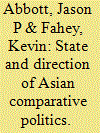

|
|
|
|
|
| Publication |
2014.
|
| Summary/Abstract |
In this article we explore the state of the discipline of comparative Asian politics. In particular we analyze five aspects of research on Asia: whether the empirical scope of research is largely noncomparative; the extent to which that research is empirical rather than theory-generative; whether it pertains to public or foreign policy; if it relies on qualitative rather than quantitative methods; and the gender and geographic concentration of those conducting the research. After coding and analyzing data from 461 articles from eight different journals, we demonstrate that research on comparative Asian politics is more likely to be empirical, qualitative, focused on the country as unit of analysis, and disproportionately written by male academics educated and/or working in North America, Western Europe, or Australia.
|
|
|
|
|
|
|
|
|
|
|
|
|
|
|
|
| 17 |
ID:
191125
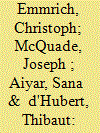

|
|
|
|
|
| Summary/Abstract |
Burma, or Myanmar as it was renamed in 1989, is largely ignored within the discipline of South Asian Studies, despite its cultural, religious, economic, and strategic significance for the wider worlds of Asia. Burma is often studied either in isolation or alongside Southeast Asian countries such as Thailand, Vietnam, and Malaysia, despite its equally important historical and cultural connections to communities, states, and networks across what is now India, Bangladesh, Sri Lanka, or Nepal. In this Roundtable, four scholars of South Asia discuss Burma's erasure within the discipline, the origins and limitations of traditional area studies frameworks, and the possibilities afforded by Burma's inclusion within a more expansive conception of South Asia.
|
|
|
|
|
|
|
|
|
|
|
|
|
|
|
|
| 18 |
ID:
112410
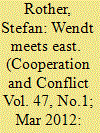

|
|
|
|
|
| Publication |
2012.
|
| Summary/Abstract |
The major theories of International Relations (IRT) differ significantly as far as their concepts of conflict and cooperation are concerned. However, they share one common denominator: They are deeply rooted in Western experiences and intellectual history. Recently, a growing literature on the possibilities and benefits of a non-Western IRT has emerged. This article proposes a 'via media': a theoretical approach that can be applied to Western and non-Western IR alike, taking into consideration the specific historical, ideational and cultural contexts. Based on social constructivism as developed by Alexander Wendt, it is argued that the existence of a collective identity among states in a given region can manifest itself in distinctive logics or cultures of anarchy. These are based on norms of conflict or cooperation that can be established through interaction, can be proposed by outside agents and localized, or can be affected by the re-negotiation of state identity caused by domestic events. In addition, there are cultural path dependencies: norms rooted in the cultural memory or consciousness of a region which tend to be ignored by interpretations that merely focus on current events or established Western models of cooperation. Area studies can contribute to provide this context.
|
|
|
|
|
|
|
|
|
|
|
|
|
|
|
|
|
|
|
|
|